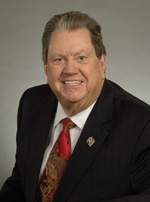
Monday, December 31, 2007 was Bill Hogarth’s last day as Assistant Administrator for Fisheries after 7 years as leader of NOAA Fisheries and more than 13 years of Federal service to the Nation.
He will continue to serve as the U.S. Commissioner and Chair of the International Whaling Commission through the end of the next annual meeting in June 2008. On January 15, 2008, he will begin his new job as the Interim Dean at the College of Marine Science, University of South Florida, in St. Petersburg, Florida.
As the final days were winding down, Hogart said he has no regrets about his seven-year term as the leader of NOAA Fisheries.
“It’s been a great run filled with progress and positive change,” he said. “Although there are things that I did not complete that I would have liked to, I believe I’m leaving U.S. fisheries in better condition than I found them. I’d like to thank the Administration for this once in a lifetime opportunity and for giving me complete support to get the job done.”
However, Hogarth said he would be leaving several key projects he hopes his successor will continue to advance. Two that are particularly pressing are stronger international conservation measures for Atlantic bluefin tuna and Congressional passage of legislation to allow offshore aquaculture in the United States.
“The United States has got to become more self-sufficient in producing seafood, and the only way to do so is through more aquaculture,” Hogarth said. “The U.S. government has an opportunity to become a world leader in sustainable and responsible aquaculture production, and we have an obligation to pursue aquaculture as a form of food production and safety for our citizens.”
Hogarth took the helm of the National Marine Fisheries Service in early 2001 while implementing plans to end overfishing and rebuild the nation’s overfished fisheries, both of which were requirements of the 1996 Sustainable Fisheries Act.
Hogarth said the agency made a lot of progress to turn around decades of overfishing. The agency implemented rebuilding plans to slow the rate of overfishing and begin to restore fish populations. However, conflicting mandates and vague wording in the law prevented the agency from ending overfishing and caused a high volume of litigation against the agency. One of Hogarth’s first major initiatives was to streamline internal reviews and strengthen impact assessments and administrative processes, which reduced litigation from hundreds of cases to a few per year and a greater success in the outcome.
The Administration’s 2004 U.S. Ocean Action Plan documents Hogarth’s priorities for U.S. fisheries. The plan calls for more fisheries to come under quota-based management, which would allow fishermen to become more profitable and independent business managers. It also calls for an end to overfishing, which led to a revision of the Magnuson-Stevens Act that strengthened the overfishing provision and agency actions to end overfishing by 2010.
Hogarth led the National Marine Fisheries Service to become a more transparent, open, and accessible agency. He considers his initiative to promote the seafood and health message to be one of his most important and lasting accomplishments at NOAA. He forged new partnerships with the Food and Drug Administration and other federal agencies to increase seafood monitoring and also funded a comprehensive study through the National Academy of Sciences that found the benefits of seafood outweigh the risks.
Hogarth said the new law requiring an end to overfishing by 2010 will be tough on fishermen, but he has no doubts that this short-term sacrifice will lead to long-term prosperity for the oceans, American fishing fleets, individual fishermen, and coastal communities. He added that we’ve come a long way, but there’s still a lot left to accomplish before our work is complete.
Hogarth will remain active as the U.S. commissioner to the International Whaling Commission, and will remain a trusted advisor and friend to the Fisheries Service. on January 15, he will become the interim dean of the College of Marine Science at the University of South Florida.


Be the first to comment